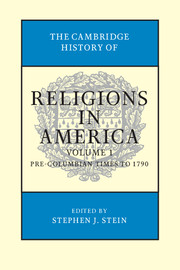Book contents
- Frontmatter
- Contents
- Contributors
- Editor's Introduction
- SECTION I BACKGROUND ON RELIGIOUS TRADITIONS – PRE-1500S
- SECTION II RELIGIONS IN THE POST-COLUMBIAN NEW WORLD – 1500–1680S
- SECTION III RELIGIOUS PATTERNS IN COLONIAL AMERICA – 1680S–1730S
- 12 Spanish Catholicism in the Caribbean, New Spain, and the Northern Frontiers
- 13 French Catholicism in New France
- 14 Congregationalist Hegemony in New England, from the 1680s to the 1730s
- 15 The Middle Colonies, 1680–1730
- 16 Religion in the Southern English Colonies, 1680s–1730s
- SECTION IV RELIGIOUS DIVERSITY IN BRITISH AMERICA – 1730S–1790
- SECTION V AMERICAN RELIGIONS IN THE EIGHTEENTH-CENTURY INTERNATIONAL CONTEXT
- SECTION VI THEMATIC ESSAYS
- Index
- References
16 - Religion in the Southern English Colonies, 1680s–1730s
from SECTION III - RELIGIOUS PATTERNS IN COLONIAL AMERICA – 1680S–1730S
Published online by Cambridge University Press: 28 July 2012
- Frontmatter
- Contents
- Contributors
- Editor's Introduction
- SECTION I BACKGROUND ON RELIGIOUS TRADITIONS – PRE-1500S
- SECTION II RELIGIONS IN THE POST-COLUMBIAN NEW WORLD – 1500–1680S
- SECTION III RELIGIOUS PATTERNS IN COLONIAL AMERICA – 1680S–1730S
- 12 Spanish Catholicism in the Caribbean, New Spain, and the Northern Frontiers
- 13 French Catholicism in New France
- 14 Congregationalist Hegemony in New England, from the 1680s to the 1730s
- 15 The Middle Colonies, 1680–1730
- 16 Religion in the Southern English Colonies, 1680s–1730s
- SECTION IV RELIGIOUS DIVERSITY IN BRITISH AMERICA – 1730S–1790
- SECTION V AMERICAN RELIGIONS IN THE EIGHTEENTH-CENTURY INTERNATIONAL CONTEXT
- SECTION VI THEMATIC ESSAYS
- Index
- References
Summary
When the English set up their first permanent settlement in what became the southern United States, they envisioned transplanting English life and institutions with relative ease. Those who survived the first year at Jamestown, Virginia, after arriving in 1607, knew differently. The struggle to carve a society in what seemed a strange wilderness required extraordinary strength and determination. It also involved fashioning afresh social institutions, including religious ones, for familiar models simply did not transfer readily from the mother country to the colonial enterprise.
The traditional story of religion in the southern colonies focuses on the Church of England, which had legal standing at some point in each of them, and then on the gradual ascendancy of an evangelical style. In reality the picture is more complicated. From the start, religious life included interaction with Native American tribal cultures and their ways of being religious. After 1619, when the first slave ship arrived in Virginia, it also involved intimate association with African tribal modes of religious expression. Although the assumption was that the church in the southern colonies echoed the Church of England as it existed across the Atlantic, the colonial setting as well as the interplay with Native Americans and Africans meant that many religious cultures were transformed, not just transplanted.
- Type
- Chapter
- Information
- The Cambridge History of Religions in America , pp. 328 - 346Publisher: Cambridge University PressPrint publication year: 2000



